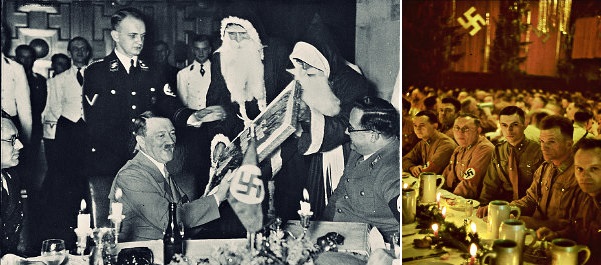
The leaflet A Nazi Guide to Christmas is composed of twenty pages filled with clear-cut instructions for Nazi Party members on how to celebrate their Christmas. It was printed way back in 1937 by the Nazi Party’s Saxony branch, the Heimatwerk organization. This arm of the party was organized the year before the pamphlet was published. It was formed as the “promoter of Saxon Germanic culture as a shining example of true Germanness”.
There never was an intention to mass produce the A Nazi Guide to Christmas leaflet. However, it was distributed among the Nazi Party’s bureaucrats and in turn, they were the ones who would disseminate the information to the population making sure that the latter follow on to the new way things had to be.
Starting off with the statement “no festival is as German as Christmas”, the Nazi Guide to Christmas gives off clear directions from how Christmas tree baubles should be placed or what songs to sing during the holidays.
Here’s how Christmas would have looked like if Nazi Germany would have had its way.
Have a “Nazi” Christmas…?
Nazi disciples were reminded in A Nazi Guide to Christmas that Christmas wasn’t a Christian celebration at all. This was because Nazism viewed organized religion a competitor, thus, it was one of the movement’s enemies.
There was an exact number of baubles specified that needed to be placed on one’s Christmas tree. Additionally, in place of an angel, a star or a fairy on top, a swastika should be placed, instead. This was a firm recommendation which meant, it was to be compulsory.
Nazism placed Germanic myths and legends central to the celebration of Christmas instead of the birth of Jesus Christ. Therefore, it was specified that the holidays was introduced to the contrary of the Church’s wishes. The leaflet emphasized that Christmas rooted from pagan origins and the priests just had to reinterpret it in light of Christianity.
Furthermore, A Nazi Guide to Christmas emphasized that Mary was the German mother and that Jesus Santa Claus was no longer situated inside the crib but was relocated in a cradle to epitomize the German people’s constant renewal.
In this light, the manuscript highlighted that it was not the Three Wise Men who came to flock the reason of the celebration but the German workers as well as the peasants.
It also advised parents to make their gift giving similar to the “hide-and-seek” game so that the festival would be about “Germanic fertility Jubilee” and not about Christ.
It went on to state that Nativity pageants in schools should be replaced with plays with an emphasis on fairy tales so as to put a German stamp on the celebration.
What to say in prayer was even specified in the leaflet. It was as follows:
“We spent Christmas in the field, during combat, with the Germans. One was always with us… He is still with us. We greet him!”
“Him” alluded to Hitler, who, the Nazis viewed, as the “Savior of the Germans.”
The leaflet was discovered in one of the repositories of the Institute of Saxon History and Folklore, which is situated in Dresden, Germany.